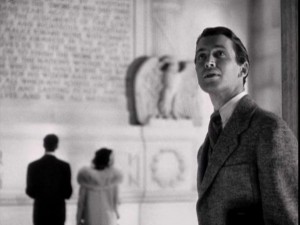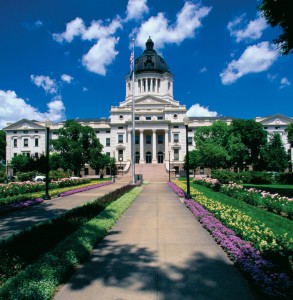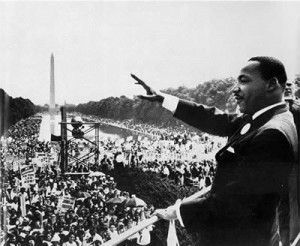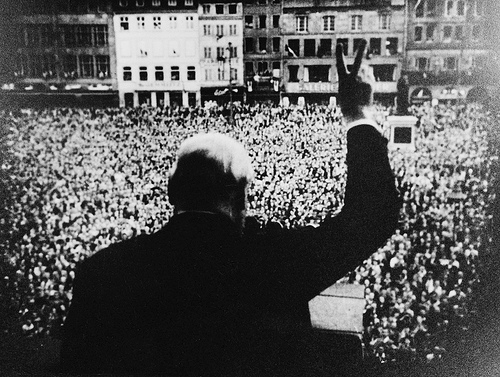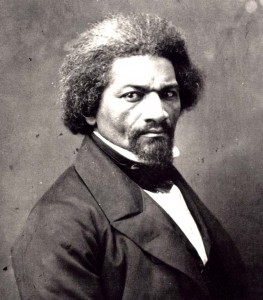“I went to the woods because I wished to live deliberately, to front only the essential facts of life, and see if I could not learn what it had to teach, and not, when I came to die, discover that I had not lived. I did not wish to live what was not life, living is so dear; nor did I wish to practise resignation, unless it was quite necessary. I wanted to live deep and suck out all the marrow of life, to live so sturdily and Spartan-like as to put to rout all that was not life, to cut a broad swath and shave close, to drive life into a corner, and reduce it to its lowest terms.”
― Henry David Thoreau, Walden: Or, Life in the Woods
Henry David Thoreau
“Lost Causes”
Individual actions shape the politics of our time. What we see and what we wish to see create a desire to influence our society in a better direction. We cannot choose not to care. Our conscience does not allow indifference; it merely determines the level of involvement we are compelled to give of ourselves.
It is easy to be disengaged and look with frustration at the present problems that trouble our country. Yet optimism must be nurtured. It requires effort to maintain a hopeful outlook. What we speak is what we encourage. We can be very suggestible and easily influenced. Our minds require reflection on the positive things we experience to encourage a hopeful vision of the future. That is why old movies like Mr. Smith Goes to Washington from 1939 still remain so appealing. Frank Capra could have directed this story of Washington politics toward hopelessness and discouraged his audience. He could have told us all politicians are weak, and humanity at its core is no different. But he chose to lift us up and define what we desire in our elected officials. He told us it is worthwhile to believe in the better nature of humanity and know that many of those who seek political office are there to contribute to something special. Throughout the film, naïve, newly appointed Senator Jefferson Smith is tricked, hounded and slandered. In an attempt to control him, his mentor, Senator Paine leads the attack. After nearly 20 hours of lonely filibuster, hoarse from talking, tired from fighting, with his senate colleague’s ready to impeach him, Senator Smith confronts Senator Paine with a last appeal.
“I guess this is just another lost cause, Mr. Paine. All you people don’t know about lost causes. Mr. Paine does. He said once they were the only causes worth fighting for. And he fought for them once, for the only reason any man ever fights for them. Because of just one plain, simple rule: “love thy neighbor.” And in the world today full of hatred, a man who knows that one rule has a great trust. You know that rule, Mr. Paine. And I loved you for it – just as my father did. And you know that you fight for the lost causes harder than for any others. Yes you even die for them…”
We want our elected officials to be servants of unique moral courage, who will fight for the lost causes because of their inability to look away, and who have a willingness to sacrifice for values they believe to be right. We must also search for that courage within ourselves. In 1964, Clair Engle was a young senator from California. While serving, Senator Engle became ill from brain cancer. He became partially paralyzed and lost the ability to speak. On June 10, 1964, there was an attempt to end the Democratic filibuster in the senate blocking the Civil Rights Act. Without the ability to speak, nearing death, Senator Engle found a way to participate because he understood the importance of this “lost cause,” he understood that on that day, he and ninety-nine other senators would determine the rights of fellow human beings and advance a cause fought for by so many since the founding of our country. For almost 200 years, people suffered to be equally protected in our society; they refused to give up and others didn’t give up on them. Right will eventually prevail if lost causes aren’t abandoned. Over time, others will join that cause. When Senator Engle pointed to his eye signaling his “aye” vote, the senate surpassed the required two-thirds majority by 4 votes.
We want politicians to inspire us with their actions as much as their words. We want to know they care as much as we do. We want to know that it is impossible to erect a barrier that will keep them from pushing for justice, that intimidation and threats will fall on deaf ears. We want them to believe that their neighbors and fellow citizens are more important than any election.
We all need to be reminded not to abandon our lost causes, to keep working when things become difficult or someone tells us the odds are not in our favor. A lost cause is only truly lost if we choose to abandon it. If we don’t fight for our lost causes, who else will? Who can we trust to believe in our lost causes as much as we do?
The perennial fight for lost causes illustrates the never ending desire behind politics and elections in our country.
Often our elected officials do become out of touch, complacent, and maybe they forget why they are there, but generally they are not beyond redemption. Together we can remind them to fight for the lost causes that have defined our nation since its inception.
Voters decide direction of our future
 In most things we want to choose our direction.
In most things we want to choose our direction.
That’s why automobiles have steering wheels, and trains glide on pre-laid tracks and boats have sails that harness the wind. We are not content to just go. We want to have a choice in the direction.
That is why we vote. Our nation’s election process gives us the opportunity and responsibility to put our hand on the wheel. We can determine our future like the rudder can dictate the course of a sailboat on the sea.
When we take part in the political process, we know our involvement is an investment in more than ourselves as individuals. Our actions are an investment in the future direction of our country.
We have all been given the ability to convey passion, to encourage momentum rather than settle into the inertia around us, and to influence a world seemingly out of our control. We must first decide that our actions matter, and we must believe that everything we do has the potential to nudge the world in a direction of our choosing.
As Americans, we believe we can impact our future: That is why we care, that is why we question, and that is why we refuse to sit complacently by and accept an outcome we do not want.
The compass of the future is volatile and uncertain, indicating a great civil tug of war in which the country is pulled in one direction or another during tumultuous times.
It’s up to each side to present the vision that pulls those on the sidelines in. At certain times we must pull harder than others; sometimes we are expected to influence the course of the future and be the steady hand that guides our journey.
In the U.S., we do not have to settle for a direction we do not want; we can vote to redirect the future being laid out before us.
Before we can be effective, however, we must check our cynicism toward politics at the door and remind ourselves that every two years we are given the opportunity to choose new representation and, with our voices and our votes, give our nation a resurgence of the freedoms and ideals that we value as Americans.
The importance of each election cycle is up to us. Hesitation to engage in the opportunities we have to influence our future has costs. We must ask ourselves as individuals what we are willing to do to ensure our ideas and ideals emerge.
To have the greatest impact, we must join together with others who believe as we do and give of ourselves with intensity.
We must believe in each other and fully understand the choices we make. We must believe the present course is correctable. We have seen what a few can do to change the direction of our country.
It was not chance that determined the history we’ve read about or seen on television.
The fortunate among us have even seen our government improve as a result of our action.
Ronald Reagan recognized the responsibility all of us share: “Let us be sure that those who come after will say of us in our time, that in our time we did everything that could be done. We finished the race; we kept them free; we kept the faith.”
Passivity not good
 Sometimes life feels as if it would be easiest if we do just enough to get by; maybe it would be easier to avoid rejection, to hold back and not give our best simply because we might not succeed even if we do try.
Sometimes life feels as if it would be easiest if we do just enough to get by; maybe it would be easier to avoid rejection, to hold back and not give our best simply because we might not succeed even if we do try.
But by passively seeking our goals, we suffocate hope but not the dream, not the desire, merely the fulfillment to the question of whether we could have attained success. Passivity is the lifeblood of disappointment. It allows our dreams to die a slow death and increases the burden we carry by distancing us from our purpose.
The passage of time does not mean that we have abandoned our interest in an unattained goal. We’ve simply allowed it to linger like a flickering flame in an airtight room. It will never burn to its full potential unless we open the door. Unless we make an effort, our ambition will eventually die out without ever having the chance it deserved.
As children, we are allowed to dream our way through the world. As adults, it is better for us to burn a dream down by failing miserably in the pursuit or honestly cast it aside rather than leave it flickering in our imagination with only the faintest chance of realization.
How many people do we know who wanted to pursue a career, but shrugged it off as impossible or unrealistic? Did they really put the dream aside, or does it still remain quietly unfulfilled? How many of us want to do something but don’t because we are afraid we will fail? There are friends around us who believe we have greater potential than we give ourselves credit for, and then there are those who doubt and never give us a chance.
There is very little in this world that is certain and very little that we must accept. But if we never step forward, if we keep our aspirations to ourselves, certainty’s hold on our lives increases.
Though we might be inclined toward passivity, the world around us does not favor that tendency. It is not led by people who are passive. The world is led by those who envision what they want and pursue it, the people who accept a difficult challenge rather than waiting for the ideal situation.
“If you have built castles in the air, your work need not be lost; that is where they should be. Now put the foundations under them” (Henry David Thoreau).
If we want that promotion, we have to make it known; if we want to be a leader, we have to step forward in difficult times; if we want to be an actor, we must be willing to step out onto the stage; if we want to be a political figure, we must have the courage to believe in ourselves when very few will.
Life is about going from point A to point B, but to get there we must be willing to commit ourselves. We must push ahead in an aggressive world even if we feel intimidated.
If we want to be a success, we have to be willing to start at the bottom, where it is most difficult. We must never let doubt hold us back from the pursuit of our purpose.
We must have the confidence to motivate ourselves before others encourage us. To persuade others to believe in us, we must demonstrate our belief in ourselves.
Public Servants
In South Dakota, we are represented by a citizen Legislature that mirrors the diverse communities across the state.
Many of those legislators also have ties to the smaller communities they originally came from.
Our legislative body is made up of farmers, small-business owners, teachers and individuals from all walks of life who feel they have a service to offer. They are the kind of people who are willing to take time from their busy lives and careers to serve our state. With compensation of $6,000 a year, legislators don’t serve for money or fame.
In our state, we have nearly unlimited access to our elected officials. Because they come from our communities, they understand what we are going through and live through the same ups and downs with us.
South Dakota legislators are a group of individuals who willingly participate in the tradition of public service.
The more I watch our legislators, the more I’m thankful that I live in a state where the people who represent us come from differing backgrounds, yet all have similar ties to the people and communities across the state. They all have their own strengths and convictions that make them unique, yet they share a common vision and interest in the future of our state.
Whether we agree or disagree with their decisions, our legislators put in the time few are willing or able to commit.
There are some perks to being a legislator, but they also put themselves forward to be judged publicly by the members of their community. Sometimes what they feel is right is not popular, and solutions are often not simple. The decisions they make will affect us, and they know it. They know that the people judging them are their friends and neighbors.
Being an elected official tests individuals and defines their principles. Serving might cost them friendships and create adversaries while it strengthens their allies. Yet individuals continue to serve for little pay and little attention because they have the commitment and resilience to step forward.
Too often, we minimize the importance of our state lawmakers by comparing them to those who serve in Washington, but our state legislators have an equally important role.
In a recent study by the American Legislative Exchange Council (alec.org), South Dakota ranks fourth in economic performance among the 50 states. According to the authors, “Generally speaking, states that spend less – especially on income transfer programs – and states that tax less – particularly on productive activities such as working or investing – experience higher growth rates than states that tax and spend more.”
The policies created by our legislators add to South Dakota’s strength. In a difficult recession, our legislators have put our state in a relatively strong position. For example, our state legislators must work until they reach a consensus that balances the budget for the fiscal year.
The qualities that we look for in our legislators are integrity and sincere authenticity. We want them to go out of their way to listen to the people of their districts who have varying opinions so that they can form a solid understanding of issues.
Most of them understand that differences of opinion regarding issues are frequently not partisan; different opinions often come from individuals of the same party.
Our best legislators are disciplined in principles, strong character and faith, with the highest respect for the people they serve and the offices they hold.
With our legislators, it is their strong quality of character that we should value, as well as their willingness to step forward and serve our state.
Move forward through hardships
We are not born with hardened hearts. Unfortunately, it is sometimes an effect of our desire to do more than we are able when we feel overwhelmed and frustrated.
The world takes its toll on us all in one fashion or another. Our hearts become callused trying to shield ourselves from the pain and the disappointments around us.
Revealing emotion or allowing others to see how deeply we care increases our level of vulnerability. We all know of times that we pull back. But what do we lose if we withdraw from the world we care about? What is there in our lives that we truly care about that we can keep to ourselves and still be content?
We are not meant to keep our emotions to ourselves.
A flower that fails to bloom goes unnoticed and can never be fully appreciated. The intense feelings we have inside of ourselves are meant to be shared in a constructive way and can influence the lives of others around us. Without revealing emotions we appear inanimate and uncaring.
We would all like to see a world where the most defenseless life is treated with respect and the weakest individuals are able to thrive not merely because they can provide for themselves but also because we extend our hand to them, and they reach out in return to others.
We must never allow ourselves to become numb to suffering or accept the idea that our actions don’t make a difference.
A gentler society with a stronger resemblance to our own vision of humanity does not come about by simply wishing for it. We must be willing to enter the arena, stand amid the instability, reassemble the pieces and know that our involvement can ease suffering with compassion.
When we feel as if we can tolerate no more, we can look to the doctors and nurses in the emergency rooms, the men and women who provide for neglected children and the people who work with humane societies across the country. All of them stand strong in the sometimes vicious cycle of everyday life.
These people have a strength that could be absorbed by us all. They have an ability to go forward in hard times, an ability to help where they can and not destroy themselves when they can’t. These are the people who help us see that there is joy in life that comes from helping one another.
It’s not always easy to openly express ourselves and act on our beliefs. But without emotional expression we can suppress the true meaning of who we are. Life is too short to hide our emotions because of insecurity. We are not all that different from one another. Emotions hurt us and scare us, yet all that is best in life is a part of our emotions.
It is easy to focus on all we are unable to achieve rather than all of the things we can accomplish. We all know people who seem to care too much and withdraw because of frustration or disappointment. But when the people who care so much withdraw, we lose the ones who make the most difference. If we retreat from frustration and cynicism, we can accomplish nothing. But if we stay and participate and refuse to give in to the frustration, then we can change a piece of our world.
“The King will reply, ‘I tell you the truth, whatever you did for one of the least of these brothers of mine, you did for me.’” Matthew 25:40 (NIV)
http://www.aberdeennews.com/apps/pbcs.dll/article?AID=/20100519/OPINION02/5190301/-1/OPINION
Never surrender
Martin Luther King Jr. epitomizes my idea of an underdog. He wasn’t willing to accept the external status he was born with or the idea that some men are more important than others because of the pigment of their skin. He had faith in the idea of changing a culture through nonviolence. When other leaders promoted violence, he stood firm on the ideal of peaceful protests. King believed that Americans would see what was right and reject racial injustice. Even his assassination could not kill the ideas he lived for. His words and actions were burned into our conscience in a way that could not be forgotten, and respect for his vision and his ideals live on. He was born to a class with fewer freedoms and fewer rights than other Americans, but he chose to challenge the structure of the times and saw the way to freedom was through non-violence. Within ourselves, often invisible to others, we know the fear that holds us back, that cripples us. But Dr. King overcame his fears.
Most of the time the underdog does not win the battle, but if they stay true to their principles they can change the world by changing the way we think and how we look at others. Like Dr. King, we are given endless imagination and then a life where we decide our own path to accomplish our dreams. We know what we believe, and we know how far we are willing to go. We know when we can compromise and when we cannot. Our lives represent our convictions.
In a sense, we are all underdogs with obstacles mounting before us, challenging us to live our lives as we see fit without wavering or succumbing to temptations to veer off the path we know is right.
Ironically, it is in victory that the underdog must beware that the position he has won does not become more important than the challenge he worked to overcome. Too often the desire to maintain power makes us lose sight of our goals. There are few like Dr. King who can resist so many temptations that could pull them off course.
We’re going to be told we can’t, we will be told not to try, we will be given reasons and excuses. We’ll be told that the odds are against us but none of them can get in the way of purpose and conviction and belief. When we feel passionately enough all those voices will be drowned out by our voice from within that tells us we can succeed. Over the coarse of our life, the principles we surrendered too easily will likely haunt us, when we remember the times we settled for almost or decided that our struggle was too hard, while we wonder what could have been accomplished if we’d had the persistence and ability to overcome the difficult times. It’s in the principles we refused to abandon that we will feel the most pride. We must believe that what we strive for is within reach.
Like Winston Churchill said in his 1941 speech to the children of Harrow School nearing the height of World War II. “Never give in—never, never, never, never, in nothing great or small, large or petty, never give in except to convictions of honor and good sense. Never yield to force; never yield to the apparently overwhelming might of the enemy.”
Finding the light in the darkness
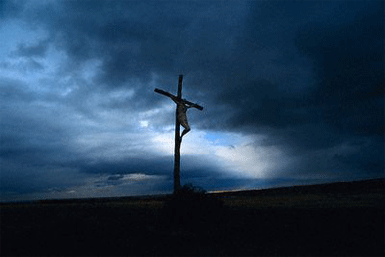 We can learn a lot through our friendships.
We can learn a lot through our friendships.
I grew up Lutheran and, until last year, had been in a Catholic church only once to attend a funeral. I was asked by a Catholic friend to attend the Stations of the Cross. Stations of the Cross is most often observed on Friday evenings during Lent. I found it very moving and discovered that it enriched my understanding of the suffering Jesus endured for our sins.
Everyone in attendance is given a booklet to follow along and respond. Each image on the church wall is a station that portrays a point of Jesus’ journey. The congregation listens while the priest reads the text for each station, and an altar boy stands in front of the window that represents that station.
In the first station, Jesus is condemned to death. The priest continues through the story of the crucifixion to the 14th station, where Jesus is laid in the tomb, and closes with the resurrection.
It was striking to me that the images and emphasis on each station helped me feel Jesus’ suffering. Through the pictures in the book and by the responses we made, we focused not only on the resurrection, but also on the punishment Jesus experienced. These were acts of cruelty and barbarism that are hard to imagine. Jesus’ suffering becomes real, not just words that are said. His pain confronts us and shows us that, even as the son of God, the pain he felt was the pain any man would feel.
Jesus did not die because of his actions but because of ours.
The Stations of the Cross strengthened my faith in a way that only recognizing the extent of his suffering can. He accepted the cruelest punishment and yet, in the end, brought peace and worth and meaning to the world.
We learn that, even in the presence of darkness, there is a pinhole of light that shines through. The darker it is, the more intensely that light shines. We feel an attraction to the light because that light stands out within the blackness that surrounds it. Darkness clarifies the light. Like lamplight that during the daylight can go unnoticed, in the darkness that same light will illuminate our surroundings.
Jesus showed his commitment to us through the darkness of human cruelty. His crucifixion was for us. Through evil, through suffering, through immense pain, the light Jesus showed us was love. Love is stronger than all else because it is truer and mightier than all the horrible acts committed in this world.
The lessons of Christianity are love and forgiveness. Jesus’ death and resurrection make us aware of the kind of compassion and mercy that touches our heart. That which touches our heart is more powerful than that which pierces our skin. An event that could have inspired rage inspired love; cruelty that could have created hatred spawned forgiveness. The verdict of death resulted in eternal life.
Jesus shows us the depths we are capable of and offers us a chance for renewal.
Following Lent, Easter is a time when we celebrate Jesus’ resurrection. Sometimes seeing familiar ideas from a different perspective can reawaken our faith and allow us to grow in significant ways. I found the Stations of the Cross expanded my understanding of all Jesus was willing to endure for us.
http://www.aberdeennews.com/apps/pbcs.dll/article?AID=/20100310/OPINION02/3100302/-1/opinion
Despite acts of evil, goodness still endures
Eighteenth century philosopher Edmund Burke said, “All that is necessary for the triumph of evil is that good men do nothing.” Anyone who follows the news can see that there is evil and cruelty in this world. But I believe that average people with good intentions and strong convictions will stand-up for what they believe and sacrifice or endure hardship to ensure that those wrongs do not go unchallenged.
I believe whenever there is an act of evil that makes us shudder, someone will fight against it. I know with all my heart that no matter how difficult the situation, we each have convictions that we will defend, rights that we will not let anyone take away from us, and a commitment to the less fortunate or the persecuted among us. We must be able to recognize that everyday people around us have the same courage in them. Our faith in human decency during the hardest times allows us to see those flashes of goodness through the most difficult challenges.
There is an abundance of cynicism and disillusionment today, but when I look back through historical examples of evil, no matter how awful an atrocity was, it sparked opposition. Someone acted to right the wrongs being committed, and they continue to inspire us to act on our beliefs today.
Through the most horrible situations, exceptional people refused to look the other way when they recognized injustice. They were willing to risk their safety and their lives in order to do what they believed to be right. Germans smuggled Jewish children from Nazi Germany; Frederick Douglas had the courage to ask, “What to the Slave is the Fourth of July?” and on 9/11, New York City firefighters refused to be deterred by the horror they were witnessing. Heroes spread hope in the darkest of times; they refuse to submit to the overwhelming obstacles confronting them. There are countless examples of individuals who would not give in, who stood their ground, and who sacrificed for their beliefs.
Evil draws a line in the sand and dares us not to cross for fear of the consequences to ourselves. Courage helps us step over that line regardless of the fear that at any other time would be paralyzing. Each person who crosses that line reduces the burden on the next.
Every one of us has commitments to our friends, family, or to issues we believe in. The people in our history books are remembered because they refused to submit to fear, because they felt a stronger calling to protect their beliefs and ideals than to protect their own comfort and safety. Once upon a time our heroes were regular people, until they elevated themselves.
It is not naïve to believe in the strength and decency of the people around us. There are many people in this world who will resist being weakened by external forces, who refuse to choose the painless path. We can acknowledge evil and recognize acts of inhumanity, but then we must also have faith that where evil exists, no matter how average we are, we will have the strength to rise up and speak out. Our country’s history has been determined by the good men and women who chose to challenge the evil they saw and prevent its triumph.
http://www.aberdeennews.com/apps/pbcs.dll/article?AID=/20100214/OPINION02/2140305/-1/opinion
